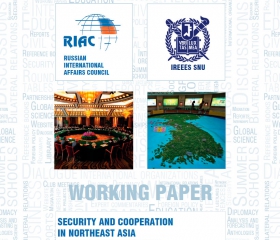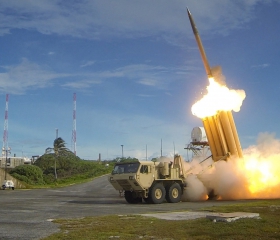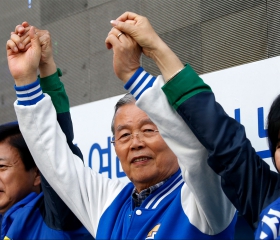Russia–South Korea: Is a “Neighbourly Agreement” Possible?
Президент России Владимир Путин встречается
с президентом Республики Корея
Пак Кын Хе на Конференции по климату
в Париже (COP21)
(votes: 1, rating: 5) |
(1 vote) |
Doctor of Economics, Professor of Oriental Studies, Director of the Asian strategy center at the Institute of Economics of the Russian Academy of Sciences
Russia and South Korea have yet to tap the full potential of their geographical proximity and of the fact that their economies can be mutually complementary. The stumbling block is politics, with South Korea increasingly toeing the American line in the Asia Pacific Region, as witnessed by its consent to host the U.S. missile defence system. However, with its own interests in mind (for example, to avoid becoming a hostage to the contradictions between the United States and China), South Korea is paying close attention to developing relations with Russia, especially regarding economic ties and investments in the Far East. The forthcoming Russia–South Korea summit on the fringes of the Eastern Economic Forum may give impetus to the implementation of these plans. For Russia, it is important that Korea realizes there is no alternative to political and diplomatic methods in settling the Korean issue and that the policy of isolation and pressure is futile.
Russia and South Korea have yet to tap the full potential of their geographical proximity and of the fact that their economies can be mutually complementary. The stumbling block is politics, with South Korea increasingly toeing the American line in the Asia Pacific Region, as witnessed by its consent to host the U.S. missile defence system. However, with its own interests in mind (for example, to avoid becoming a hostage to the contradictions between the United States and China), South Korea is paying close attention to developing relations with Russia, especially regarding economic ties and investments in the Far East. The forthcoming Russia–South Korea summit on the fringes of the Eastern Economic Forum may give impetus to the implementation of these plans. For Russia, it is important that Korea realizes there is no alternative to political and diplomatic methods in settling the Korean issue and that the policy of isolation and pressure is futile.
Russia–South Korea relations are not at their best. Political contacts are not very active and states’ stances on major international problems differ considerably. After the rouble plummeted, trade between the two countries shrank, primarily because imports from South Korea dropped by half. The South Korean government, though it has not officially joined the West’s sanctions against Russia over the events in Crimea, does not encourage new projects. Meanwhile, financiers are limiting transactions with Russia, citing international rules. The presidents of Russia and South Korea have not met for three years and the agreements reached during their last talks have largely remained on paper. Will the September meeting in Vladivostok deliver a breakthrough?
Moscow, like Beijing, sees the deployment of the U.S. missile defence system in Asia as a strategic game-changer in the region.
The Missile Defence Issue
The announcement that South Korea had agreed, under pressure from the United Stated, to deploy the U.S. Terminal High Altitude Area Defense (THAAD) system in the south of the country to counter the “North Korean missile threat” was made in July, when a meeting between Vladimir Putin and Park Geun-hye had already been fixed. Moscow chose not to cancel the meeting on these grounds, especially since it was important for Russia to demonstrate the futility of American efforts to isolate the country from Asia. However, the atmosphere of the meeting soured. Moscow’s sharp reaction to the deployment of THAAD came as a surprise for South Korea: during the upcoming summit, South Korea will probably try to explain its position, allay Russia’s fears and reach an understanding, perhaps in exchange for some attractive economic projects. It is important for South Korea to demonstrate that it seeks to maintain good relations with the neighbouring great powers, especially in light of the sharp deterioration in its relations with China over THAAD.
Russia is unhappy that the main subject of inter-governmental discussions with such an important and advanced Asian country as South Korea is relations with a third state.
The trouble is that Moscow, like Beijing, sees the deployment of the U.S. missile defence system in Asia as a strategic game-changer in the region. Russia sees THAAD as a positional element of a new anti-Russian missile defence system in the Asia Pacific, from Southeast Asia to Alaska.
While the United States stands to gain from the conflict that flared up over the issue, insofar as the deployment of THAAD fits into its strategy of “containing China,” South Korea finds itself in a difficult position. Its main worry is that it threatens relations with China, Korea’s key trade partner. China, too, has refused to blindly follow the policy of sanctions against the North Korea, something South Korea had counted on. South Korea underestimated the fact that its relations with Russia would also suffer. Seoul thought that THAAD designed against incoming missiles and not equipped with radars that cover Russia (unlike China) would not worry Russia. Now South Korea has its job cut out to regain Russia’s trust and prove that Seoul is, after all, capable of pursuing an independent policy.
Even so, divergences over international issues that are key to Russia, notably over the Ukrainian and Syrian crises, do not bode well for the success of the meeting.
North Korea: A Bone Of Contention
The parties are unlikely to see eye-to-eye when assessing the threats and challenges to regional security. Seoul’s main concern is the North Korean nuclear threat and it is seriously considering its options in the event of a sudden collapse of the Pyongyang regime. While Russia is opposed to the North Korean nuclear programme, it does not believe in such a perspective and therefore reacts calmly to Seoul’s constant calls to toughen sanctions against North Korea and bring pressure to bear on it. Moreover, Russia is unhappy that the main subject of inter-governmental discussions with such an important and advanced Asian country as South Korea is relations with a third state that Russia does not see as a threat to its interests.
South Korea does not pay enough attention to the fact that Moscow opposes pressure on sovereign countries and interference in their internal affairs. Russia would like to build its relations with North Korea without having any doubts about the legitimacy of its government, no matter how hard the media are trying to prove the opposite as part of the ongoing information war.
Seoul still hopes it will persuade Moscow to take a tougher line on Pyongyang and is likely to be disappointed with the outcome of the meeting.
Although Russia complies with its obligations under the sanctions against North Korea imposed by the UN Security Council in May 2016, it is not inclined to interpret them too broadly to the detriment of its own economic interests (the South Korean side would like Russia to deny access to North Korean workers because, according to the South Korea, they contribute to financing the North Korean nuclear and missile programmes).
Seoul still hopes it will persuade Moscow to take a tougher line on Pyongyang and is likely to be disappointed with the outcome of the meeting. However, we cannot rule out that the South Korean press will launch a strident campaign to get the message across that the Russian leader went all the way with his South Korean opposite number and promised cooperation in solving “the North Korea problem” through the uniting the country on South Korean terms. Possible claims of this kind are designed to boost the South Korean president’s approval rating inside the country and in the process take a jab at the North Koreans.

Security and Cooperation in Northeast Asia:
the Russian-South Korean Experts Joint Paper
Russia’s advice on ways to improve relations between North and South Korea is likely to be ignored by the latter. Russia wants to see all the interested parties discuss their concerns frankly and solve problems via political and diplomatic methods, rather than through military and economic blackmail. South Korea bets on isolating North Korea and evades talks and offers from Russia to help establish good-neighbourly relations between the two Koreas.
Russia is interested in – and has long been walking the walk in this respect – in involving North Korea in trilateral projects to build a common energy and transport-logistical network. But Seoul wants to have no part of it, although as late as 2015 it promised to join the tripartite projects. The 2013 agreements on South Korea joining the pilot Hassan–Rajin logistical project have not been carried out, because after North Korea’s nuclear tests, South Korea severed all contacts with the country and unilaterally reneged on all its promises.
At the same time, South Korea is sceptical about multilateral talks involving North Korea, citing the reluctance of the North Korean side to take part in them (in fact, Pyongyang has repeatedly declared such a readiness, although it rejects the ultimatum that it give up its “nuclear card”). Russia is urging the parties to resume six-party talks without pre-conditions and start discussing ways to ensure peace and security in Northeast Asia by political rather than military means. But that is unlikely to happen. Instead new negotiation formats are constantly being discussed, starting with five-party talks (without North Korea), to two- and three-party talks (the United States, Japan and South Korea) with the main aim of stepping up pressure on North Korea.
Is an Economic Upsurge Possible?
South Korean business has demonstrated an unflagging interest in the Russian market and the desire to work there, even without encouragement from Seoul (which is afraid to incur the wrath of the United States). So perhaps a breakthrough in bilateral economic cooperation could eliminate problems over the range of relations between Russia and South Korea? Let us hope that the work being done by the governments will open up new vistas for strengthening relations.
An important untapped reserve is to attract Korean investments into projects in Priority Development Territories in the Far East.
In any case, trade between Russia and South Korea, which shrank by a staggering 33.8 per cent in 2015, has continued to decline: in the first half of the year, it dropped by a quarter, with Korea now accounting for just 3.5 per cent of Russia’s foreign trade. There is virtually no new investment, although work on many projects continues; since 2010, accumulated direct investments dropped by a third (from $1.9 to $1.3billion). In previous years, South Korea had set up car assembly, electronics and confectionery enterprises in Russia and expressed an interest in shipbuilding. Cooperation in space exploration is progressing. However, so far things have not gone beyond the “investigative” stage.
It would seem that South Korea should be interested in getting a foothold in the agricultural sector in the Far East and strengthening its positions in fishing by building production capacity and ships, on the medical services market, and in scientific and technical cooperation, which enables countries to obtain new technologies for commercialization (whether this is good or bad for Russia is another question). There are opportunities for practical actions through the coordination of projects for the Russia–Korea Joint Investment Platform.
An important untapped reserve is to attract Korean investments into projects in Priority Development Territories in the Far East. Korean investors eye Far East development projects with interest: Priority Development Territories and free port regimes may reduce risks and boost the returns on investments in the Far East transit infrastructure. Priority Development Territories can offer less costly sites, a skilled workforce, access to natural resources, tax benefits, simplified terms of doing business and special mechanisms for protecting rights. The Korean side could join the development of the port infrastructure in the Far East, as well as ship-building projects. Perhaps South Korea would be interested in creating industrial clusters in the Far East similar to the inter-Korean Kaesong Industrial Region, which was shut down for political reasons. At the same time, the Korean side has criticized the vagueness of the rules, the lack of opportunities to accurately carry out feasibility studies for projects, and persisting bureaucratic barriers.
To some extent, such problems could be solved by creating a free economic zone between the Eurasian Economic Union (EAEU) and South Korea, an announcement that could be the highlight of the summit. In effect, both the policy of the EAEU and the South Korean Eurasian initiative are aimed at removing trade barriers and developing the Eurasian infrastructure. Experts at the Russian Foreign Trade Academy and the Korea Institute for International Economic Policy (KIEP) are conducting a study of the modalities of free trade zones, the results of which were presented in late August at a seminar attended by representatives of South Korean and the EAEU. Further down the road a Joint Research Group may be set up under the European Economic Commission and a mechanism may be launched of official consultations of the parties in preparation for talks on a trade agreement between the EAEC and the Republic of Korea. However, many important groups of goods may be excluded from the free trade regime at an early stage to prevent one side gaining an unfair advantage on markets (cars, electronics and agricultural produce), so the negotiations could go on for a while.
To some extent, such problems could be solved by creating a free economic zone between the Eurasian Economic Union (EAEU) and South Korea.
Proceeding from the same philosophy, both sides should be interested in creating a common transport, logistical and energy network between China, South Korea, Russia and North Korea. Although the agreements on South Korea joining trilateral projects have not got off the ground, this is no reason to give up on the idea. In the longer term, as Russia has long been proposing, both rail transit and gas supplies via North Korea, as well as a super-grid (super-high voltage power grid) to supply Russian power, could be considered. But this is all in theory so far. For its part, South Korea has expressed interest in North Sea Route projects, shipbuilding, and transporting carrying heavy cargo and natural resources via this route.
Although the agreements on South Korea joining trilateral projects have not got off the ground, this is no reason to give up on the idea.
Cooperation in the fuel and energy fields is an important part of the economic dialogue between Russia and South Korea. Supplies of mineral raw materials to South Korea currently accounts for three-quarters of Russia’s total exports to the country. South Korea is the second biggest buyer of Russian LNG. The upcoming dialogue will offer a chance to discuss the development of cooperation between Russia and South Korea in expanding LNG supplies. South Korea seeks to diversify its energy mix by reducing its dependence on oil and gas. The country plans to build a nuclear power plant and bring the share of nuclear energy to 44 per cent. Russian experience may be useful in the development of the nuclear industry and sharing information both on nuclear fuel and on building and operating nuclear plants.
As regards “the three parts of the basket”, i.e. academic cooperation, cultural and education programmes and tourist exchanges, there is little hope that cooperation in these fields will improve. In the economic sphere, South Korea still perceives Russia as a source of energy and raw materials and a (still shrinking) market. There is not much hope for a meeting of minds on the problems of the Korean Peninsula, because the fundamental approaches of Russia and South Korea are wide apart, especially since South Korea remains a loyal ally of the United States in the region, and a division into triangles (the United States–South Korea–Japan and China–Russia–North Korea) is becoming a real danger. Come to think of it, there is not much sense in achieving epoch-making agreements on the issue: although Park Geun-hye has a year and a half until the end of her presidential term, her possibilities have shrunk as a result of the mounting opposition and some internal and foreign policy miscalculations, and she looks like a duck with two lame legs. Even so, a positive outcome may create more favourable opportunities for business, provided the South Korean authorities give their approval.
(votes: 1, rating: 5) |
(1 vote) |






